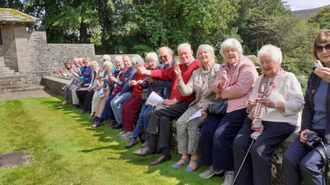Christians Aware: 'Making Space for Nature'

Participants studying Lichen
A commitment to protect Earth's biodiversity was made at the conclusion of a recent Christian Aware summer school in the Yorkshire Dales. Around 25 participants promised to be particularly active during the Season of Creation, which starts on 1 September.
The event was held 23-28 July, on the theme of 'Building Biodiversity,' at Parcevall Hall, the Anglican Diocese of Leeds Retreat Centre, set at the eastern limit of the Craven Fault which stretches 30 miles from Stump Cross Caverns to Ingleton in the Dales. It was a week when environmental catastrophes were hitting the news headlines, particularly heatwaves and fires in the Mediterranean countries and exceptional flooding in parts of Asia.
To deepen appreciation of the diversity of nature, Dr Judith Allinson of Green Christian ran two botany sessions. The first on Lichens, which are made out of fungi and algae, had the group using hand lenses to study the beautiful patterns on the Lichens on the wall just outside the conference centre. There are around 1000 lichens in Yorkshire and she explained that lichenologists looking at lichens growing on trees and rocks can see how much Nitrogen-oxide air pollution there is in Yorkshire. Nitrogen is the third most serious planetary boundary being broken after Biodiversity and Climate Change. It comes from fertilizers on fields, from slurry, from chickens and pig farms and traffic pollution.
The second session was at the internationally important Malham Tarn Bog, owned by the National Trust. Judith told us that bogs are a store of peat - a store of carbon, but 80% of bogs are losing their carbon because of government-funded drainage in the past and to the after-effects of pollution. Bogs are also a store for water - they hold water and release it slowly, reducing flooding in the lowlands. They are home to unique plants - in Malham Tarn's case species of Blue Moor Grass, Ragged Robin and many more.
The summer school - an annual event of the ecumenical charity - explored some examples of what is being done to build biodiversity in the Yorkshire Dales, with talks, slide shows, discussions and visits.
This included learning about 'the 'Wild Ingleborough' project which works with the local community to protect nature. The focus is on protecting whole ecosystems rather than the preservation of specific species and the underlying principle is 'Making space for nature.' Jeremy Purseglove took up themes in his book, 'Working with Nature' where he shared his experiences of work around the world to bring harmony between wild nature and cultivation by humans. Jane Skinner, an Anglican priest, presented a fascinating case study of Lundy Island, and participants marvelled at the bird life.
We heard about sustainable farming from several farmers. We visited John Dawson's Bleak Bank Farm, a Dales farm near Clapham with the most beautiful scenery. He's the fifth generation of his family to run the farm since the 1920s and his son is fully involved. UK farm animals have much higher health standards than imported meat, he reported, and he encouraged us to support British farmers. "I want the buyer to take pride in the food they buy as I do in producing it." We heard about lambing, sheep shearing, dairy farming, maintaining 10 miles of dry-stone wall and the huge amount of administration involved in farming these days. Running small farms is stressful and he told us that 88% of farmers under the age of 40 rank poor mental health as the biggest problem facing farmers today.
He was one of several of the speakers we met who knew the work of Mary Colwell to protect the Curlew and he had delayed cutting silage in a field where chicks were hatching. "We waited until they flew away," he told us. And he was firm that, "we won't use GM (genetic modification)."
My own inputs focused on the macro level, particularly initiatives of Columban missionaries' Justice, Peace and Ecology Teams to save habitats globally. The Columbans attended the UN's Biodiversity COP15 in Montreal last December as part of an interfaith advocacy presence. The UK government has promised - along with many other countries - to protect 30% of its land for wildlife and conservation. We must hold them to this promise.
Participants in the summer school worked as a community during the week - sharing ecumenical worship, bible study and discussion and weaving faith insights into the issues highlighted. We left motivated and hopeful that Christians have a role to play in helping build a more sustainable world.
Links:
Dr Judith Allinson's Blog
Christians Aware


















